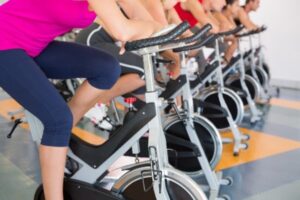Multitasking During Exercise May Boost the Results of Your Workout

If there’s one thing we know about multitasking, it’s that it’s kryptonite to even the most productive person. Oodles of studies have shown that no matter how good you think you are at it, or how emotionally satisfying it feels, trying to do more than one thing at a time ultimately causes you to do everything worse. However, there may now be an exception to the rule—and it may do wonders for your health.
For those of us who enjoy sweat sessions on a stationary bike, a recent study from the University of Florida found that when people cycled while completing a thought-focused task, their speed actually improved while multitasking.
Researchers were surprised by the results, to say the least. “Every dual-task study that I’m aware of shows that, when people are doing two things at once, they get worse [ at those tasks ],” study author Lori Altmann said in a statement. “Everybody has experienced walking somewhere in a hurry when the person in front of them pulls out a phone, and that person just slows to a crawl. Frankly, that’s what we were expecting.”
They’d originally set out to determine the degree to which multitasking suffers in patients with Parkinson’s disease, so researchers monitored 28 participants with Parkinson’s and 20 healthy older adults as they completed 12 cognitive tasks—once while sitting in a quiet room, and again while cycling.
Each task ranged in difficulty, from saying the word ‘go’ when a blue star was shown on a projection screen to repeating increasingly long lists of numbers in reverse order of how they were presented. While they put their minds and bodies to the test, a video motion capture system recorded each participants’ cycling speed.
Participants’ cycling speed was about 25 percent faster while doing the easiest cognitive tasks. “As participants were doing the easy tasks, they were really going to town on the bikes, and they didn’t even realize it,” Altmann said. “It was as if the cognitive tasks took their minds off the fact that they were pedaling.”
And although their speed slowed as the cognitive tests became more challenging, their speed wasn’t any slower than when they pedaled sans distractions. According to researchers, one reason for this could be the arousal we feel as we anticipate finishing a difficult cognitive task.
“What arousal does is give you more attention to focus on a task,” Altmann said. “When the tasks were really easy, we saw the effect of that attention as people cycled very fast. As the cognitive tasks got harder, they started impinging on the amount of attention available to perform both tasks, so participants didn’t cycle quite so fast.”
Altmann and her team are currently looking into whether these multitasking benefits can work with other types of exercise, such as when using an elliptical. These findings suggest easy cognitive tasks can encourage us to exercise more vigorously, and they plan to make this a topic for future research.
Will you try this multitasking trick the next time you’re visiting the stationary bike?
Related on Organic Authority
How to Make Regular Exercise a Habit You Can Keep
New Research Shows How Aerobic Exercise Changes Your DNA
This Is What Really Happens When You Burn Fat
Spin class image via Shutterstock

